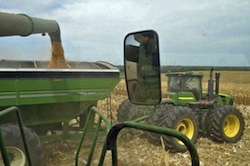A new report has been issued by FAPRI-MU regarding the impacts of various RFS waiver options to inform decision makers who will determine if and how a wavier should be issued to adjust biofuel mandates for the Renewable Fuels Standard (RFS2). The request came from various sources in response to the 2012 drought that still continues.
“Renewable Fuel Standard Waiver Options during the Drought of 2012,” outlays several conclusions:
- Reducing the overall RFS has a small negative effect on the corn price during the current marketing year because overall ethanol use would be almost as much even if there were no mandate.
- The waiver might have larger impacts on markets for crops harvested a year from now. A key question is if biofuel use during the waived years can count against future mandates, as is normally permitted within certain limits. If so, then it will be less difficult to meet the larger and more challenging mandates in the future.
- Biofuel use mandates interact with each other and with markets, leading to potentially offsetting impacts. For example, if the advanced mandate is waived, then ethanol imports and exports are affected more than total domestic use.
Renewable Fuels Association (RFA) President Bob Dinneen responded to the study. “The new FAPRI study is just the latest in a series of recent reports that show waiving the RFS would not have the types of impacts claimed by the livestock groups and grocery manufacturers. The suggestion that an RFS waiver would significantly bring down feed prices and reduce retail meat prices is  absolutely absurd. The only real impacts of a waiver would be to discourage farmers from planting corn next spring and to interrupt and delay important investments in new feedstocks and advanced biofuels technologies.”
absolutely absurd. The only real impacts of a waiver would be to discourage farmers from planting corn next spring and to interrupt and delay important investments in new feedstocks and advanced biofuels technologies.”
The research showed that a waiver might be expected to reduce corn use for ethanol by just 1.3 percent in 2012/2013 and reduce corn prices from $7.87 per bushel to $7.83 per bushel. Estimates for the the 2013/2014 market year show that corn use for ethanol might fall 6.6 percent and corn prices might decrease 3.2 percent. In addition, the report found that a waiver of the RFS would not meaningfully increase the amount of corn available for feed use in 2012/2013. Rather there would only be 25 million more bushels of corn being fed to livestock, a 0.6 percent increase over the case where there is no waiver.
FAPRI researchers noted that there are important uncertainties in their analysis. For example, there is a mismatch of marketing year corn data and calendar year biofuel mandates, which could be a source of error. Another is the nature of ethanol demand, particularly how quickly markets could shift back to fuels without any ethanol. A third uncertainty is about current market conditions. The markets for mandate compliance certificates reveal how difficult it is to meet mandates at present and in the near future, but they are newly created by the mandates and are not well understood at this point.

